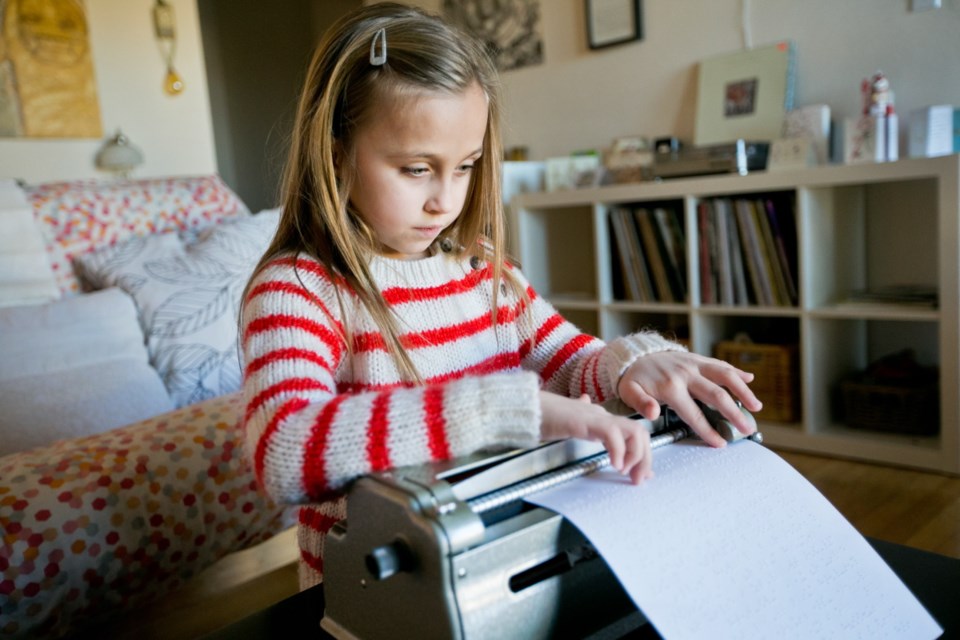Maggie Wehrle’s mom often gets up to the sound of her eight-year-old daughter tapping out words on her braille typewriter.
“It’s just her having a dream or waking up and having ideas,” said Melissa Wehrle.
The Margaret Jenkins Elementary student won first place in the kindergarten to Grade 3 category of the CNIB’s Canada-wide creative writing contest. Her story was written in braille, a system of raised dots — interpreted by the fingertips — that can represent words, math and music.
Maggie, who was born blind, said she loves to write: “It’s like just pouring your ideas into a piece of paper. It’s really fun.”
Her tale, The Underground Festival, is about at a girl who goes to a shadow world below the earth.
There is also a “shadow queen” who steals people’s shadows, said her mom, Melissa Wehrle.
With her fingers skimming over the page, Maggie read the opening lines: “You might not know about a world I once lived in, a world where everything was beautiful. Even the dirt was made out of silver. The moons were fiery jewels and chattered with the stars. Dragons sailed above the stars, so that I could hear the beating of their wings by my ear.”
Maggie and a number of other winners were invited to read their submissions at October’s CNIB National Braille Conference in Toronto.
Her current story topic? A college girl and her overweight cat.
“It’s sort of a young-adult book,” Maggie said.
She said her love of writing grew out of reading.
“I started writing because I was reading the Harry Potter series, and they were really inspiring,” she said. “And the fiction, it was crazy, it was fun to read and I really liked writing about it.”
Maggie said she has had plenty of books read to her by her parents. “Really, I’ve been part of a family that reads a lot.”
Statistics show that only about 10 per cent of people in North America with vision loss read braille, down from about 50 per cent in the 1950s.
Modern technology has overtaken braille to an extent, but not in Maggie’s world.
“It’s really important for me to have access also to what other people can read, because even if I had a book on audio, it would feel like something’s missing,” she said.
“You want to know what does it feel like to actually hold a book and to actually write down words.”
Maggie has taken part in braille competitions, which test general proficiency, placing second in her age class at a Los Angeles event.
She discovered writing contests through Daphne Hitchcock, her braille teacher at Margaret Jenkins. Because of Maggie, her sighted classmates are also getting the chance to learn about braille, Melissa said.
Word of Maggie’s accomplishment is out in time for World Braille Day, happening Monday, said CNIB spokeswoman Alexandra Korinowsky.
“We’re always trying to produce awareness about braille,” she said. “There’s been a lot written over the past couple of years that braille is becoming obsolete because of technology.
“In fact, braille is literacy and technology can’t replace that.”



